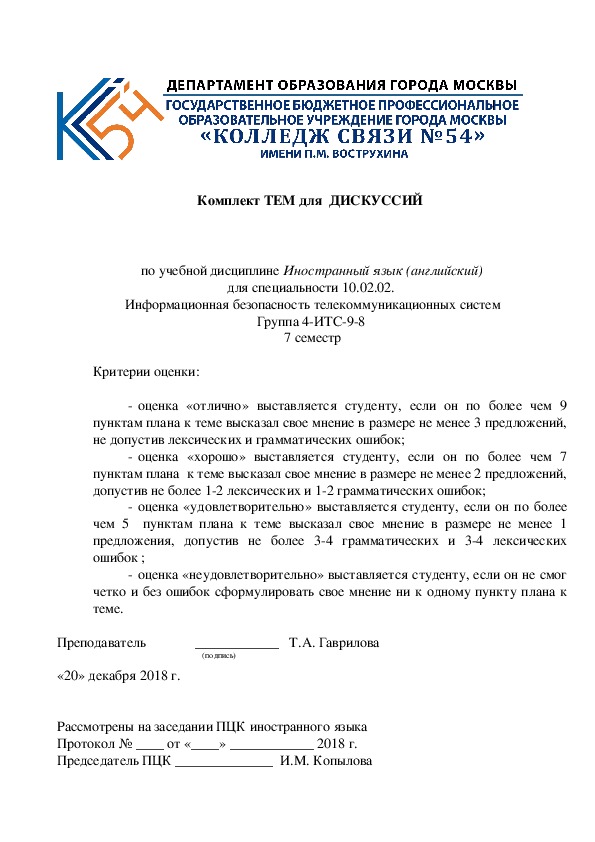Темы для дискуссий по английскому языку для специальности 10.02.02. Информационная безопасность телекоммуникационных систем (4 курс)
Руководства для учителя
docx
английский язык
Взрослым
14.12.2018

Данное методическое пособие направлено на формирование лексических навыков монологических высказываний в форме дискуссий по темам, предусмотренным программой для групп по специальнотси 10.02.02 Информациолнная безопасность телекоммуникационных систем. Оно содержит 10 тем, по 10 вопросов в каждой для обсуждения, а также критерии оценки. Данный материал будет полезен преподавателям, использующим активные методы ведения урока.
Темы для дискуссий для специальности 10.02.02..docx
Комплект ТЕМ для ДИСКУССИЙ
по учебной дисциплине Иностранный язык (английский)
для специальности 10.02.02.
Информационная безопасность телекоммуникационных систем
Группа 4ИТС98
7 семестр
Критерии оценки:
оценка «отлично» выставляется студенту, если он по более чем 9
пунктам плана к теме высказал свое мнение в размере не менее 3 предложений,
не допустив лексических и грамматических ошибок;
оценка «хорошо» выставляется студенту, если он по более чем 7
пунктам плана к теме высказал свое мнение в размере не менее 2 предложений,
допустив не более 12 лексических и 12 грамматических ошибок;
оценка «удовлетворительно» выставляется студенту, если он по более
чем 5 пунктам плана к теме высказал свое мнение в размере не менее 1
предложения, допустив не более 34 грамматических и 34 лексических
ошибок ;
оценка «неудовлетворительно» выставляется студенту, если он не смог
четко и без ошибок сформулировать свое мнение ни к одному пункту плана к
теме.
Преподаватель ____________ Т.А. Гаврилова
(подпись)
«20» декабря 2018 г.
Рассмотрены на заседании ПЦК иностранного языка
Протокол № ____ от «____» ____________ 2018 г.
Председатель ПЦК ______________ И.М. Копылова (подпись)
«____»__________2018 г.
1. Раздел № 3. Обучение активному владению иностранным языком в области
будущей специальности
Тема 3.1 Цифры, числа, математические действия, Основные математические
понятия и физические явления
Урок 65 Цифры, числа.
1. Who invented the number system we use today?
2. What do you know about the history of numbers?
3. Why are numbers so important?
4. What are the two most important numbers in the world?
5. Some people say that math is the language of the universe. Do you agree? Why or
why not?
6. What is your favorite number? Why is it your favorite number?
7. What numbers are unlucky?
8. Should students be allowed to use calculators to do math in school or should they
learn to do it without calculators first?
9. Ask your partner two how many/much questions.
10.What is the first thing you think of when you think of three?
2. Урок 66 Математические действия.
1. What springs to mind when you hear the word ‘mathematics’?
2. Do you like ‘maths’ – the British English pronunciation and spelling, or ‘math’ the
American versions?
3. Were you good at maths at school?
4. Did you like maths at school?
5. Are you good at mental arithmetic now?
6. What is maths useful for nowadays if we have computers and calculators?
7. Would you like to study maths again?
8. Why is maths so important at schools?
9. Are people who are really good at maths very interesting?
10.Did you have a favourite or a hated maths teacher?
3. Урок 67 Измерения информации.
1. Mathematical Theories of Measurement (“Measurement Theory”)
2. Fundamental and derived measurement
3. The classification of scales
4. The measurability of sensation
5. Representational Theory of Measurement
6. Operationalism and Conventionalism 7. Realist Accounts of Measurement
8. InformationTheoretic Accounts of Measurement
9. ModelBased Accounts of Measurement
10.The roles of models in measurement
4. Тема 3.2 Документы (письма, контракты)
Урок 68 Правила оформления документации.
Are There Cover Letter Samples For Different Situations I Can Access For Free?
1. What’s The Real Purpose Of A Cover Letter?
2. What Exactly Should I Put In My Cover Letter, And What Should I Leave Out?
3. How Should I Format My Cover Letter?
4. What Are The Worst Cover Letter Mistakes?
5.
6. Who Can I Get To Review My Cover Letter For Errors and Effectiveness?
7. How Do I Handle Sticky Situations In My Cover Letter?
8. What Is The Best Way To Include A Cover Letter Along With My Resume?
9. Do I Need To State My “Objective” In My Cover Letter?
10.Are There Ways To Increase The Impact Of My Cover Letter?
5. Урок 69 Изучение основных правил составления договора, написание
заявлений.
1. What are the key elements of a binding contract?
2. Please explain what competent means regarding the requirement that an agreement
be between competent parties in order for a contract to be effective?
3. My 15year old son, who looks older, just signed a contract joining a health club
which has “dues” of $50.00 a month. Is this contract valid?
4. How does a mistake affect the enforceability of an agreement?
5. What does the term consideration mean as far as the enforceability of an agreement
is concerned?
6. What if my employer threatens to fire me if I refuse to sign the covenant not to
compete?
7. What if I were required to sign such an agreement as a condition of being hired?
8. What does the element “lawful objective” deal with?
9. Must a contract be in writing to be enforceable?
10.When is a contract deemed to have been performed or discharged?
6. Урок 70. Письма деловые и личные.
1. How would you address the recipient of an informal letter?
2. In a formal letter what is the name given to the address and date at the top?
3. If you didn't know the recipient's name, how would you close the letter?
4.
5. The main point is written in which part of a formal letter?
'With love' is used in which part of an informal letter? 6. If you didn't know the recipient's name, how would you address the person?
7. How do you end the main body of a formal letter?
8. In an informal letter you should do what?
9. In order to have the desired effect on the recipient what should a formal letter be?
10.What would you say in the opening part of a formal letter?
7. Тема 3.3 Транспорт
Урок 71
Виды транспорта.
1. How important do you think it is to use public transportation?
2. Do you think that governments should encourage public transportation more?
3. Do you think city governments should discourage use of privately driven cars
within city limits?
4. Do you have good public transportation where you live?
5. How could public transportation in your city be improved?
6. Do you think that we ought to be obligated to drive electrical and solar powered
vehicles?
7. Is the public transportation in your city efficient?
8. Is public transportation in your city too expensive?
9. If public transportation were free, would you use it more?
10.Do you think that your city government maintains the public transportation well? In
other words, are the buses and trains kept clean?
8. Урок 72 Метро.
1. Has the London Underground been used since 1860?
2. Does the London Underground carry over 2,5 million passengers a day?
3. Do all Metro trains go under the ground?
4. Are all stations equipped with escalators?
5. Was safety always one of the main concerns of London transport?
6. Can any accident happen through human error in the London Underground?
7.
8.
9.
10. Have all underground lines their own color?
Is the number of passengers carried by the Underground constantly growing?
Do express trains stop at all the stations on their way?
Are there twelve Underground lines in London?
9. Тема 3.4. Понятие о телекоммуникационной системе.
Урок 73 Понятие о телекоммуникационной системе и ее назначение.
1. What is ISUP protocol?
2. Why CPG message is required in ISUP protocol?
3. If RF power is good then what is the best Rx and Tx power?
4.
What do you mean by TSCM? Which frequency is used in voice sampling?
5.
6. What is SS7 signaling system?
7. Where memory is allocated for variables in a program?
8. What are various statuses of kernel?
9. What is the maximum decimal place which can be accommodated in a byte?
10.How personal computer can act as terminal?
10. Урок 74 Защита и хранение информации.
1. Which security control framework should I implement?
2. How can security controls help secure my organization?
3. Why aren’t more organizations using security controls?
4. How can I measure the effectiveness of my security controls?
5. How does Secure Boot work?
6. Is social media really a threat to security?
7. So is social media a weak spot?
8. Is it the employer’s responsibility to safeguard social media security?
9. What can I do if I can't I log in?
10. How do I change my security questions?
Материалы на данной страницы взяты из открытых истончиков либо размещены пользователем в соответствии с договором-офертой сайта. Вы можете сообщить о нарушении.
14.12.2018
Посмотрите также:
© ООО «Знанио»
С вами с 2009 года.
![]()
О портале


